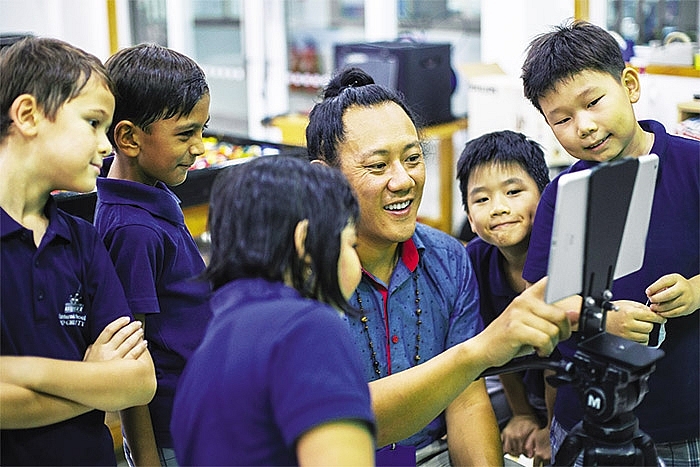Families choosing the best on offer
 |
| There is a growing demand for education that prepares children for life in the modern world |
Local actress Trinh Ngoc Bao Chau watched her sons thrive when they transferred from a public school to an international school during their 6th and 8th grades. “I have been amazed by the support they receive and the education they are getting,” Bao Chau said. “It is absolutely the best choice since we plan for them to study overseas in the future.”
International school teachers follow an accredited curriculum dictated by a qualified academic team. An international school usually provides interactive learning and critical-thinking skills along with emphasis on building children’s character as a whole with extracurricular activities such as music, athletics, and leadership clubs. Schools that can provide standardised testing can offer a snapshot of their academic averages and level of achievement. Test scores do not, however, tell the whole story and arranging a visit is a must.
“I have a five-year-old daughter. I think apart from the advantage of learning a second language at international schools, it is of even more importance that the children can learn how to think rationally and see to the heart of matters. I believe, as when they go to study abroad, they will have an advantage from such learning techniques,” shared Nguyen Huu Cuong, general director of Cuong An Thinh Co.
STUDYING OVERSEAS
While a lot of parents send their children to international schools in Vietnam, others, according to Chris Loc Dao, CEO of US Investment Services Group (USIS), have been looking into long-term investment opportunities overseas in the hope that by gaining residency in a foreign nation they can secure a place in a high-quality education system leading to world-class qualifications for their children.
Vietnamese students spend $3-4 billion a year on overseas studies, a huge amount of money, said Minister of Education Phung Xuan Nha at the question and answer session of the 14th National Assembly’s sixth session in Hanoi. The number of Vietnamese students studying abroad soared by 675 per cent over the last five years.
Open Doors, a US-based international education exchange institution, showed that Vietnam is among the 10 countries with the highest number of students studying in the US.
Vietnamese families are in search of both investment opportunities in these developed nations, with the ultimate goal of gaining residency or citizenship after a number of years, and of a sound education system where their children can gain internationally-recognised qualifications. Furthermore, the additional benefits of a well-rounded healthcare system and social security scheme add to the appeal.
“My family has carved a clear path for our children to become global citizens, which we hope will equip them to live in any country they choose when they grow up, and enable them to live a life that suits their expectations and professional skills. We have thus provided a base from which they are able to get acquainted with a multicultural environment since they were young. Compared to the traditional education environment, we have found undeniable advantages in the international education system,” said Tran Viet Linh from Ho Chi Minh City.
CIRCUMVENTING THE COSTS
Parents around the world spend an average of $44,221 on their children’s education from primary school up to the undergraduate university level, according to ‘Higher and Higher’, a report by HSBC in The Value of Education series published in 2017. The report showed that Vietnamese parents place great importance on their children’s education, allocating nearly half (47 per cent) of their household expenditures to education.
To provide better quality education for their children, more and more parents consider sending them to study abroad. According to the Ministry of Education and Training, by the end of 2016, the number of Vietnamese overseas students reached 130,000, studying in 47 countries and territories. Ten per cent of these students have their tuition either covered by the state or participate in intergovernmental education exchange programmes or receive scholarships granted by schools, while the rest are self-financed.
“In today’s competitive job market, education for young people has never been more important,” said Charlie Nunn, HSBC Group head of Wealth Management. “Parents across the world appreciate this and are willing to invest time and money to help children get the best start. Their unwavering support shows in the personal and financial sacrifices they make, from giving up hobbies and reducing leisure spending to sacrificing their personal time, parents are going the extra mile to help their children succeed.”
What the stars mean:
★ Poor ★ ★ Promising ★★★ Good ★★★★ Very good ★★★★★ Exceptional
Related Contents
Latest News
More News
- Foreign leaders extend congratulations to Party General Secretary To Lam (January 25, 2026 | 10:01)
- 14th National Party Congress wraps up with success (January 25, 2026 | 09:49)
- Congratulations from VFF Central Committee's int’l partners to 14th National Party Congress (January 25, 2026 | 09:46)
- 14th Party Central Committee unanimously elects To Lam as General Secretary (January 23, 2026 | 16:22)
- Worldwide congratulations underscore confidence in Vietnam’s 14th Party Congress (January 23, 2026 | 09:02)
- Political parties, organisations, int’l friends send congratulations to 14th National Party Congress (January 22, 2026 | 09:33)
- Press release on second working day of 14th National Party Congress (January 22, 2026 | 09:19)
- 14th National Party Congress: Japanese media highlight Vietnam’s growth targets (January 21, 2026 | 09:46)
- 14th National Party Congress: Driving force for Vietnam to continue renewal, innovation, breakthroughs (January 21, 2026 | 09:42)
- Vietnam remains spiritual support for progressive forces: Colombian party leader (January 21, 2026 | 08:00)

 Tag:
Tag:




















 Mobile Version
Mobile Version